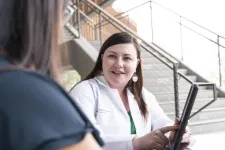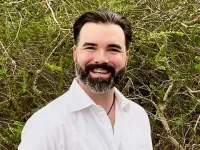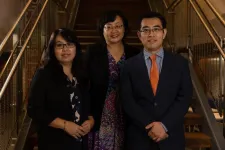(Press-News.org) New research conducted by City of Hope and supported by the American Cancer Society focuses on developing scalable educational interventions to support informed patient decision making and consent, such as online tools and applications that include visual aids or interactive multimedia.
FINDINGS
Cancer genomics experts at City of Hope®, one of the largest cancer research and treatment organizations in the United States, conducted a qualitative study that underscored the importance of properly preparing patients for unanticipated, inheritable genetic findings prior to receipt of tumor sequencing. Recently published in Genetics in Medicine, this data is an important step to improving the delivery of precision medicine to cancer patients.
In surveys, patients expressed emotions ranging from gratitude to regret depending on how much counseling they received prior to tumor testing. Providers said insufficient clinic time was a major barrier to pretest education and favored online support tools and standardized ways to offer pretest education. Some oncologists said they discussed tumor sequencing in the context of patients’ treatment but did not always discuss the possibility of secondary findings due to limited clinic time.
“Communications with cancer patients is critical so they can provide informed consent about their treatments. It is important for providers to have conversations with patients they are treating to explain the difference between somatic and germline testing and talk about the possibility that tumor testing may reveal unanticipated, inheritable findings or no actionable findings at all,” said Stacy W. Gray, M.D., corresponding author of the study, chief of the Division of Clinical Cancer Genomics and professor in the Department of Medical Oncology & Therapeutics Research at City of Hope. “Because the patient’s condition may affect their treatment preferences, clinicians should reconfirm their interest in receiving secondary findings, document the preference in the electronic medical record and time this disclosure appropriately.”
SIGNIFICANCE
Oncologists typically order tumor sequencing without extensive pretest discussions with patients about the types of results that can be identified, yet secondary genomic findings can impact medical care, lifestyle and reproductive decisions, as well as psychological well-being.
For many patients, secondary findings bring the responsibility of disseminating accurate information to family members — possibly causing psychological distress to loved ones — and navigating strained relationships within their family. These findings indicate a need for increased genetic interventions and clinician guidance to facilitate genetic information sharing within families as medical decisions are made, the study stated.
Additionally, patients with advanced cancer may be overwhelmed by medical information and may be less likely to derive clinical benefit from their inheritable genetic test results if it doesn’t come with targeted therapeutic options.
Based on this data, health care systems, labs and genetic providers may eventually need to play a larger role in patient education prior to tumor sequencing. There is a need to develop scalable educational interventions that facilitate informed consent, such as genetic websites, online tools and applications that include videos, visual aids or interactive multimedia.
BACKGROUND
Somatic or tumor sequencing can identify DNA alterations that inform clinicians if a patient will be responsive to gene-targeted therapy; however, this genetic testing can also deliver information about inheritable or germline variants — unanticipated secondary information about cancer susceptibility.
Researchers interviewed 12 patients and 19 cancer providers in the United States from both City of Hope and other cancer genomics providers, eliciting feedback about patient information needs, emotional responses to secondary findings and recommendations for improving education prior to tumor sequencing.
City of Hope has one of the largest genetic counseling departments in the United States and is reducing the likelihood that patients will be confronted with unexpected secondary findings from tumor testing — decreasing risk by offering all patients “gold standard” germline genetic testing for inherited cancer risk as part of its precision medicine study. Every single germline test is reviewed by a genetic counselor and flagged as actionable or not actionable so that information can be delivered in an appropriate, patient-sensitive way.
FUNDING
The research was supported by the American Cancer Society (RSG-17-153-01-CPHPS).
# # #
About City of Hope
City of Hope's mission is to deliver the cures of tomorrow to the people who need them today. Founded in 1913, City of Hope has grown into one of the largest cancer research and treatment organizations in the U.S. and one of the leading research centers for diabetes and other life-threatening illnesses. City of Hope research has been the basis for numerous breakthrough cancer medicines, as well as human synthetic insulin and monoclonal antibodies. With an independent, National Cancer Institute-designated comprehensive cancer center at its core, City of Hope brings a uniquely integrated model to patients spanning cancer care, research and development, academics and training, and innovation initiatives. City of Hope’s growing national system includes its Los Angeles campus, a network of clinical care locations across Southern California, a new cancer center in Orange County, California, and treatment facilities in Atlanta, Chicago and Phoenix. City of Hope’s affiliated group of organizations includes Translational Genomics Research Institute and AccessHopeTM. For more information about City of Hope, follow us on Facebook, Twitter, YouTube, Instagram and LinkedIn.
END
Electroconvulsive therapy (ECT), formerly known as electroshock therapy, involves inducing a brief seizure in the brain using controlled doses of electricity. While ECT is highly effective for certain mental illnesses, particularly depression, the reasons for its efficacy have long puzzled the fields of psychiatry and neuroscience.
Now, researchers from University of California San Diego may have an answer. In two new studies published November 16, 2023 in Translational Psychiatry, they propose a new hypothesis that ECT alleviates depression symptoms by increasing aperiodic activity, a type of electrical activity in the brain that doesn’t follow a consistent pattern ...
McWilliams School of Biomedical Informatics at UTHealth Houston reached a funding landmark with 15 faculty members awarded 16 different grants totaling more than $31 million between August and October 2023. Each grant has a focus on medical artificial intelligence (AI) innovations and advancements in research or health care.
“This is an incredible achievement for McWilliams School of Biomedical Informatics; these grants play a key role in advancing informatics research while also expanding on the important role technology continues to play in medicine,” said Jiajie Zhang, PhD, dean and Glassell Family Foundation Distinguished Chair in ...
A debate has broken out over whether Pfizer should have told pregnant women taking part in its maternal respiratory syncytial virus (RSV) vaccine trial that a trial of a similar GSK vaccine was stopped over a safety signal around preterm birth, an investigation by The BMJ can reveal.
Pfizer’s vaccine, called Abrysvo, was recently approved for use in the US and the European Union, but is not yet authorised in the UK.
Some experts have criticised Pfizer for not informing participants, while others believe notification would have been premature and caused unnecessary anxiety, reports freelance investigative journalist Hristio ...
As power generation from sources like solar and wind increases, along with the introduction of devices such as heat pumps and batteries, a new optimisation tool created at the University of Surrey will help the UK plan for a greener electricity network.
The researchers developed an algorithm to model how these smaller networks distributed electricity – factoring in how local grids could become unbalanced by adding too many heat pumps in a single area or generating more electricity than the grid could accept.
The Surrey team found that it was generally more efficient ...
The widespread adoption of nuclear power was predicted by computer simulations more than four decades ago but the continued reliance on fossil fuels for energy shows these simulations need improvement, a new study has shown.
In order to assess the efficacy of energy policies implemented today, a team of researchers looked back at the influential 1980s model that predicted nuclear power would expand dramatically. Energy policies shapes how we produce and use energy, impacting jobs, costs, climate, and security. These policies are generated using simulations (also ...
Strict embargo: 00.01 hrs GMT
Thursday, 16th September, 2023
Every year 1.3 million lives are lost to cancers caused by smoking tobacco across the UK, US and BRICS nations (Brazil, Russia, India, China and South Africa), according to a new study, funded by Cancer Research UK.
Researchers found that together, the seven countries represented more than half of the global burden of cancer deaths every year. They concluded that smoking, as well as three other preventable risk factors – alcohol, overweight or obesity, and human papillomavirus (HPV) infections caused almost 2 million deaths combined.
The study, carried out ...
Pancreatic cancer is tricky to manage because it spreads easily and early, and the tumors have a unique biological makeup. But, researchers made a breakthrough by learning about the genetic changes that occur during tumor migration — and also found a drug that can obstruct the process.
The next step is a groundbreaking clinical trial at the University of Rochester’s Wilmot Cancer Institute, planned for early in 2024, to test the drug from their laboratory discovery, said senior investigator Darren Carpizo, MD, PhD, co-leader of Wilmot’s Genetics, Epigenetics and Metabolism research program, and chief of Surgical Oncology at the University of Rochester Medical ...
As the world strives to cut greenhouse gas emissions and find sustainable transportation solutions, University of Houston energy researchers suggest that hydrogen fuel can potentially be a cost-competitive and environmentally friendly alternative to traditional liquid fuels, and that supplying hydrogen for transportation in the greater Houston area can be profitable today.
A white paper titled "Competitive Pricing of Hydrogen as an Economic Alternative to Gasoline and Diesel for the Houston Transportation Sector" examines the promise for the potential of hydrogen-powered fuel cell electric vehicles (FCEVs) ...
PROVIDENCE, R.I. [Brown University] — A new approach to examining the effects of climate change on marine ecosystems may provide a more accurate understanding of climate change responses — and predictions for future consequences — according to a new paper co-authored by a Brown University biologist.
The paper, published in the Annual Review of Ecology, Evolution, and Systematics, highlights the interplay between the trend of climate warming and the fluctuations in local temperature. These two properties cause atypically warm events such as marine heatwaves to occur with ...
A subtype of CD8 T cells, which are classically known to promote immune system responses, may be in fact regulating the immune system by suppressing immune cells causing self-destructive responses leading to autoimmune disorders and organ graft rejection. A team led by researchers from the Department of Medicine and the Transplant Research Center at Brigham and Women’s Hospital, a founding member of the Mass General Brigham healthcare system, in collaboration with researchers from the Dana-Farber ...




